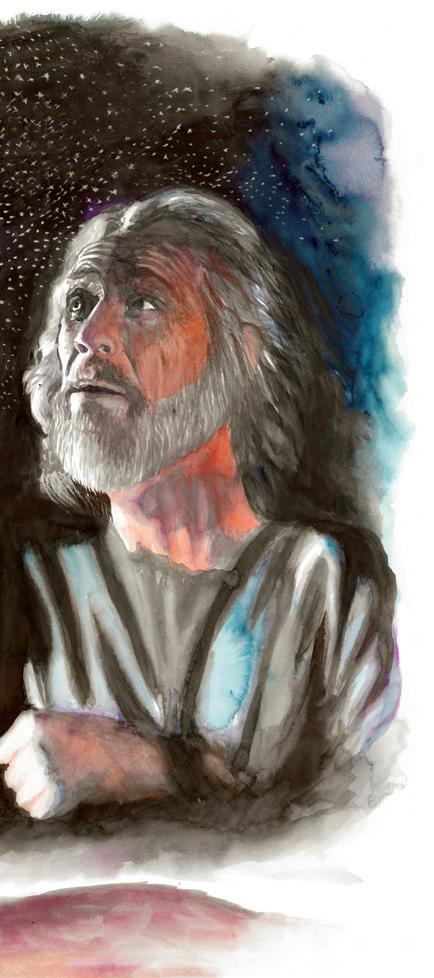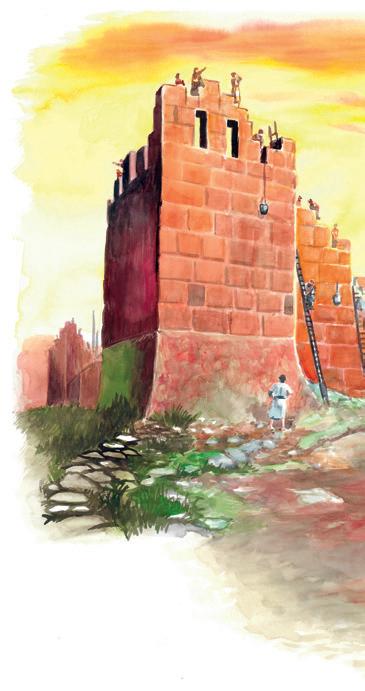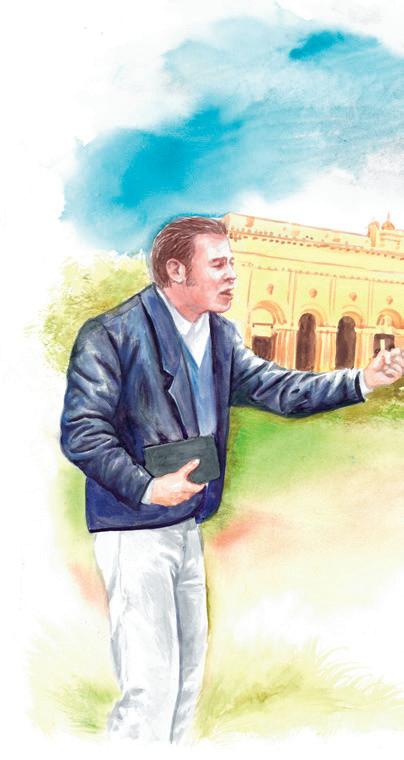
9 minute read
Music WHEN I SURVEY THE WONDROUS
from 790_English
WHEN I SURVEY THE WONDROUS CROSS MUSIC
Inspired by the death of Christ and based on the Bible, this hymn sheds an original light on the Word. It was written by British poet Isaac Watts at the dawn of the 18th century.
Advertisement
With more than three centuries of history, “When I Survey the Wondrous Cross” is a composition full of sound doctrine and an open statement of faith in the Lord. Written by English composer Isaac Watts and published in 1707, it marked the beginning of a new era of gospel music and became an example of praise to the death of the Savior.
Considered a masterpiece of Christian lyrical poetry, the hymn had a great impact in the early 18th century, as it was an innovative poem in English hymnody. It should be noted that at the time it was published, congregations in Great Britain only interpreted Psalms or musicalized biblical texts to worship God.
Inspired by the sacrifice of Jesus Christ and based on the Holy Scriptures, the song sheds an original light on the Gospel. It is easy to understand and uses images of the crucifixion of the Messiah to kindle the hope of those who sing it.
From its first stanza, it manages to capture the attention of the faithful and keeps them attentive to the elaboration of the death of Jesus of Nazareth.
RENOWNED COMPOSER Considered the father of British hymnology, Watts was born on July 17, 1674 in Southampton. He is one of the most popular authors of his time and created more than six hundred Christian compositions describing the love and mercy of God.
Today, his extensive musical work is still sung in churches and temples around the world due to its edifying content.
WHEN I SURVEY THE WONDROUS CROSS
1
When I survey the wondrous cross On which the Prince of glory died, My richest gain I count but loss, And pour contempt on all my pride.
2
Forbid it, Lord, that I should boast, Save in the death of Christ my God! All the vain things that charm me most, I sacrifice them to His blood.
3
See from His head, His hands, His feet, Sorrow and love flow mingled down! Did e’er such love and sorrow meet, Or thorns compose so rich a crown?
4 Were the whole realm of nature mine,
That were a present far too small; Love so amazing, so divine, Demands my soul, my life, my all.
The composer, member of a family faithful to Christ, believed that the Psalms were useful for worship in congregations, but he also thought that new songs had to be written to exalt the Most High.
Therefore, his poetry included complex theology in a format that is ideal for congregational singing. He also insisted that hymns in the church should be fully evangelical.
Watts found a way –never seen before in his nation– to convey spiritual feelings that still today manage to overcome with emotion those who cry out for the power of God.
Trained in Greek, Latin and Hebrew, he diligently preached the good news and became a prolific author of widely circulated educational manuals and theological works.
Isaac Watts made his praises based on passages from the Old and New Testaments, thus reflecting the presence of the Lord in his life, and with “When I Survey the Wondrous Cross” he developed a novel format to honor God. The renowned composer, who died on November 25, 1748 in the northeast of London, turned the singing of Christian poems into a devotional force.
Ralph Gower, English researcher and author of the book, describes with great skill the lifestyle and mindset of God’s chosen people and the Bible’s main writers and characters. This book, published in 1987, connects God’s Words with the Bible’s background.
The wardrobe of a person living in Bible ti
mes was fairly basic. A loincloth (maybe) was worn beneath a tunic, and there was some form of headwear. Footwear and coat were options. The slight variations in this pattern during Bible times were in color, material, and style rather than in basic provision, because clothes of this kind were best for a relatively hot climate. Paul uses the tunic, held in at the waist by a girdle, as a metaphor for the lifestyle of God’s chosen people (Colossians 3:12), and everyone would have understood that he was talking about basics.
Composed to come to a deeper understanding of the Holy Scriptures, New Manners & Customs of Biblical Times connects God’s Word with the Bible’s background. Written by British author Ralph Gower and published by Moody Press in 1987, it describes the lifestyle and culture of God’s chosen people and the main biblical writers and characters.
Most people in Bible times got up early, before the sun
was up, so that they could make the most of the hours of daylight and allow for the extreme heat at midday in the summer. Abraham got up early to obey God’s command to sacrifice (Genesis 22:3); Moses got up early in the morning to meet God on Mount Sinai (Exodus 34:4); Job offered worship early in the morning (Job 1:5); Jesus prayed before sunrise (Mark 1:35). Although it was possible for a person to stay in bed (Proverbs 26:14), it was very difficult to do so in a small house because everyone slept together on the platform.
REVEALING WORK
Pastor Gower spent most of his life exploring Biblical topics and so he offers in his book valuable information to understand the Lord’s message. Supported by more than 160 pictures, 58 original illustrations, detailed maps and diagrams, and passages from the Old and New Testaments, he introduces the world of the Hebrews and sheds light on the history of Christianity.
For most people, meals were quite simple: bread, olives, cheese, fruits and vegetables. This was the basic diet. Meat was consumed on rare occasions. Bread was the principal food and became a synonym of life itself. An expression as “eating bread” was often used as “eating a meal.” “Give us day by day our daily bread” (Luke 11:3) was a prayer asking for the daily provision of food. Bread was so fundamental and special that Jesus called himself: “I am the bread of life” (John 6:35).
For most people, meals were quite simple: bread, olives, cheese, fruits and vegetables. This was the basic diet. Meat was consumed on rare occasions. Bread was the principal food and became a synonym of life itself. An expression as “eating bread” was often used as “eating a meal.” The Egyptians “might not eat bread with the Hebrews” (Genesis 43:31, 32). “Give us day by day our daily bread” (Luke 11:3) was a prayer asking for the daily provision of food. Bread was so fundamental and special that Jesus called
LITERATURE himself: “I am the bread of life” (John 6:35).
The English writer declared that his books is based on Manners & Customs of Biblical Lands, written by theologian Fred Wight and published in 1952, which whetted the appetite of believers for the history of the Jewish nation in the middle of the past century. Gower states in the preface of his book that Wight’s work must be praised and recognized.
Western family units in the 20th century are called nuclear families, since they are small: mother, father and one or two children. Family units in Old Testament times were large and included each family member: aunts, uncles, cousins, and servants. They were called extended families. The head of the family was the father, and the head of the family group was the sheik. Abraham and his descendants were sheiks.
Western family units in the 20th century are called nuclear families, since they are small: mother, father and one or two children. Family units in Old Testament times were large and included each family member: aunts, uncles, cousins, and servants. They were called extended families. The head of the family was the father, and the head of the family group was the sheik. Abraham and his descendants were sheiks, and on one occasion, Abraham led three hundred and eighteen men of war “born in his own house” (Genesis 14:14). When Mary and Joseph visited Jerusalem with Jesus at the age of twelve, it appears they have traveled in a family like this. They were travelling in the company of “kinsfolk and acquaintance” (Luke 2:44).
USEFUL BOOK The book is divided into two parts. The first part analyzes Israelites as individuals from Biblical times in their family context. Clothing, dwellings, domestic activities, food and meals, family, education, agriculture, collecting food, shepherding, craftsmen and traders, and financiers and merchants are some of the topics carefully and thoroughly examined.
After 40 years of wandering in the desert, Jews arrived at Canaan and engaged in farming, as they had done hundreds of years ago, but now they were in a land vastly rich in plant life. Ur of the Chaldeans, birthplace of Abraham, supported on a healthy farming system based on irrigation
canals connected to a river, stone plow blades and flint sickles. Thanks to this technology, Chaldeans could yield two harvests a year. Farming was also characteristic of Egypt. The Nile flooded each year covering the river lands with silt, which enriched the soil for the rest of the year.
The second part of the book describes the national institutions and customs of the Land of Israel. Based on the Holy Scriptures, it addresses topics such as towns and villages, a view on Jerusalem, journeys and travel, hospitality, social and political groupings, government and society, warfare, leisure, leisure for tourists in current Israel, and religion.
When Abraham left Ur of the Chaldeans and adopted a nomadic lifestyle, he transformed all his riches into flocks and cattle, so he could take them with him in this journey (Genesis 13:2). The Bedouin followed his flock from pasture to pasture, from well to well, and his lifestyle was different from that of settled farmers, who often had to face tensions and conflicts between each other. This type of conflicts can be noticed in the story of Cain and Abel (Genesis 4:2) and is clear in Genesis 43:32, where Joseph (an Egyptian) would not break bread with nomadic shepherds. When most of the population abandoned the nomadic lifestyle and settled in cities or towns, there was still a need for shepherds.
Exegete, pastor, teacher and faithful servant of Jesus Christ, Ralph Gower calls us to devote to studying God’s Word in the introduction of The New Manners & Customs of Biblical Times. The scholar, who studied at the University of Liverpool, stressed that only the Scriptures provide the necessary wisdom to gain a deep insight into the Bible’s good news and peoples.
When Jews settled down in Canaan after their wandering years — only interrupted by their stay and slavery in Egypt–, they had to acquire much practical knowledge that had been already developed by Canaanites, who were dispossessed by them. Some technologies proved to be difficult to grasp.Jews never managed to develop the same skill level in the manufacture of clay objects as other nations; therefore, they imported many pots. Jewish pots were sturdy enough but never reached the high level of decoration displayed in other places.
The first time pottery was mentioned in the Bible was when David escaped from Absalom and crossed to the east bank of the Jordan.










